A Celebration of Science Fiction on National Book Lovers Day
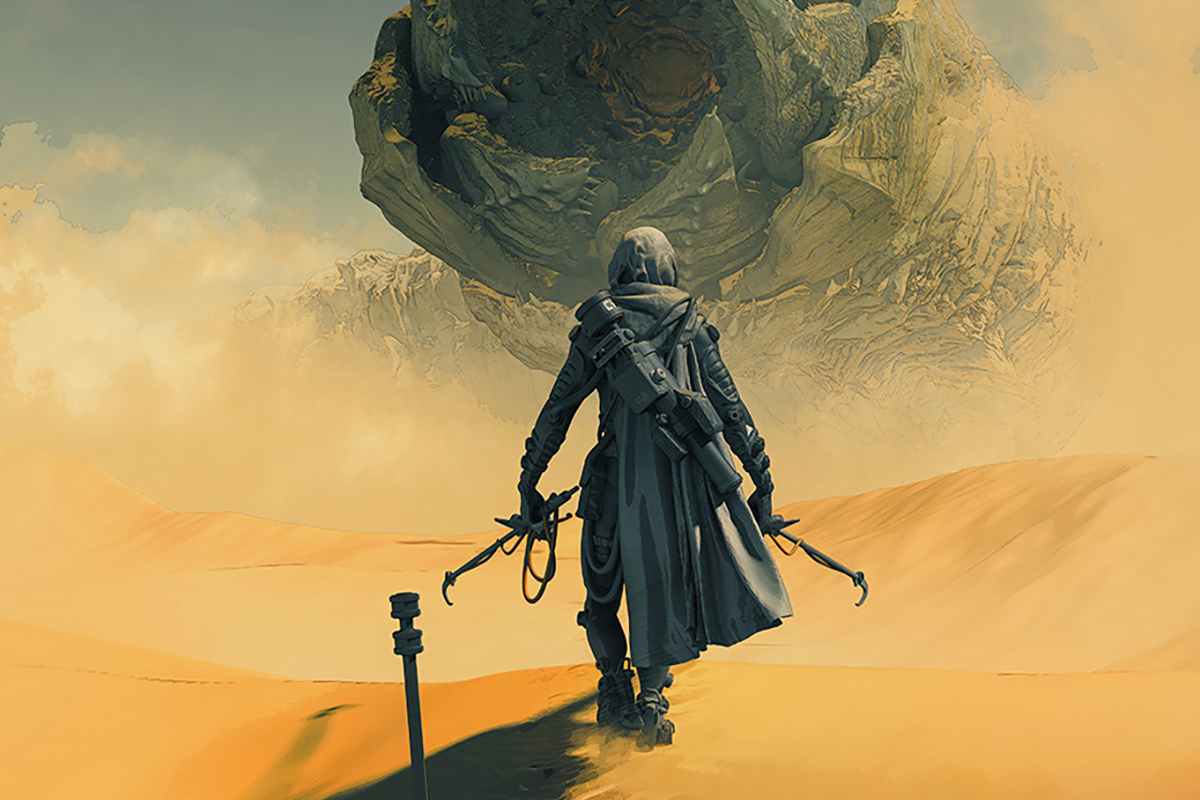
by Shannon Baldridge | Feature image of "Dune" by Frank Herbert
A consensus definition for science fiction remains contested among scholars and enthusiasts. As for me, the genre can be defined as mythology for modernity. I am of the opinion that its roots call back to the earliest known written works such as the "Epic of Gilgamesh," (c. 2100–1200 BC) with an oral tradition of storytelling by all ancient societies to attempt to explain the ineffable through the science of the time and the author's imagination.
In works by sci-fi greats such as Philip K. Dick and Frank Herbert, we can see the established and speculative science of the day being intertwined with mysticism and philosophy to tell fantastical, but believable tales of possible futures. Most agree the first work of what we would call true science fiction was Mary Shelley's "Frankenstein" or, "The Modern Prometheus" (1818). As a side note, CMU's Special Collections holds a rare first edition of this groundbreaking novel.
Science fiction today offers readers an escape from the monotony of modern living. We get a rare invitation to play in worlds rooted in science, but exploring the biggest questions humanity has the capacity to ask.
Can't get enough science fiction? Read Five Things Every Sci-Fi Fan Needs to Know and stop by our new Sci-Fi Station (located on the 2nd floor of Hunt Library).
August 9th is National Book Lovers Day, a time to celebrate not just sci-fi, but all the books that inspire and shape us. Check out these posts from previous years:
- 2023: The Book Was Better: Libraries Staff & Faculty Pick Favorite Books Adapted to Film
- 2022: Books We Love: National Book Lovers Day
"When I die, I'm leaving my body to science fiction.”
― Steven Wright
Earth Abides
George R. Stewart (1949) | Selected by Brian Mathews
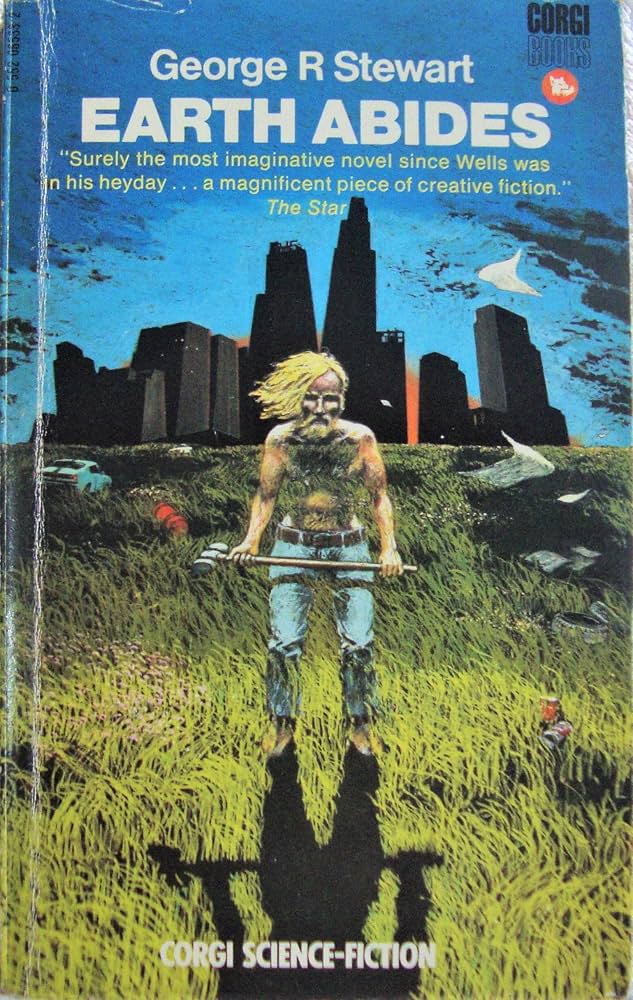 "Earth Abides" by George R. Stewart is my favorite sci-fi novel because of its pragmatic and realistic approach to the apocalypse. This timeless classic offers a profound exploration of humanity's resilience and adaptability in the face of catastrophe. - Brian Mathews
"Earth Abides" by George R. Stewart is my favorite sci-fi novel because of its pragmatic and realistic approach to the apocalypse. This timeless classic offers a profound exploration of humanity's resilience and adaptability in the face of catastrophe. - Brian Mathews
When a plague of unprecedented virulence sweeps the globe, the human race is all but wiped out. In the aftermath, as the great machine of civilization slowly and inexorably breaks down, only a few shattered survivors remain to struggle against the slide into barbarism . . . or extinction.
This is the story of one such survivor, Isherwood “Ish” Williams, an intellectual loner who embraces the grim duty of bearing witness to what may be humanity’s final days. But then he finds Em, a wise and courageous woman who coaxes his stunned heart back to life and teaches him to hope again. Together, they will face unimaginable challenges as they sow the seeds of a new beginning. - Publisher's Description
Request this Title
The Last Count of Monte Cristo
Ayize Jama-Everett (2023) | Selected by Adrianna Bennett
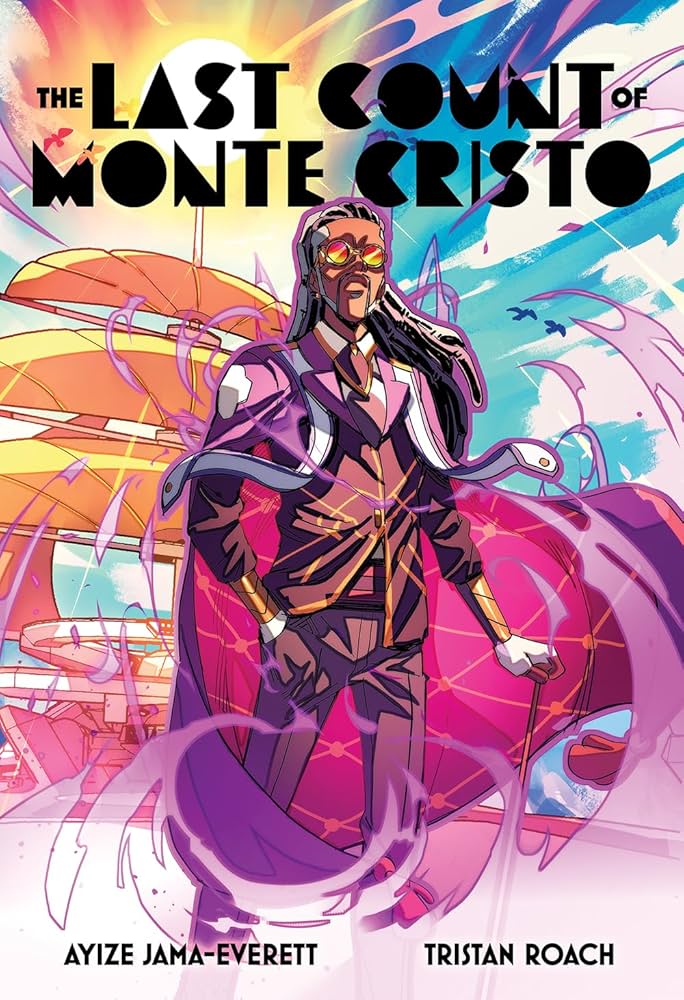 Since middle school I have loved "The Count of Monte Cristo," so when I recently stumbled upon this graphic novel adaptation I was intrigued. From the art style to the story bits that Jama-Everett tweaked for their own purposes, I loved this version of the classic. I honestly wish that this story was longer, I wanted to know so much more about this world the author had created! I try not to call any one book my "favorite" but this one is definitely up there. - Adrianna Bennett
Since middle school I have loved "The Count of Monte Cristo," so when I recently stumbled upon this graphic novel adaptation I was intrigued. From the art style to the story bits that Jama-Everett tweaked for their own purposes, I loved this version of the classic. I honestly wish that this story was longer, I wanted to know so much more about this world the author had created! I try not to call any one book my "favorite" but this one is definitely up there. - Adrianna Bennett
"The Last Count of Monte Cristo" is a radical and powerful graphic novel update that reclaims the cultural heritage of Dumas’s tale and suggests the terrible future that could threaten the human race if we continue to destroy our planet.
A bold retelling of Alexandre Dumas’s classic tale of love, betrayal, revenge, and redemption, "The Last Count of Monte Cristo" is a speculative update that pushes the narrative into a future hundreds of years after the polar ice caps have melted and submerged our planet into a new era of technology and culture.
This futuristic reinterpretation revisits the original inspiration of "The Count of Monte Cristo" — Alexandre Dumas’s own father. A greatly respected general during the French Revolution, Dumas was one of the highest-ranking officers of African descent in a Western army in history. Like the protagonist of his son’s story, General Dumas was betrayed and spent years in prison before getting a chance to return to his beloved France. - Publisher's Description
Request this Title
The Hitchhiker's Guide to the Galaxy
Douglas Adams (1978) | Selected by Mike Herzog
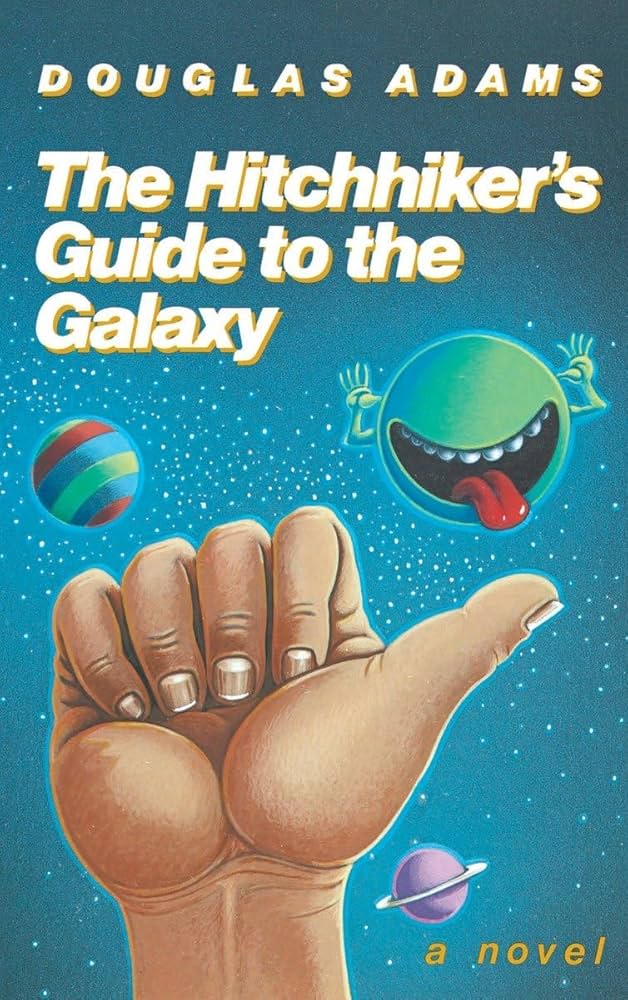 Comical, lighthearted take on a rather dystopian subject. - Mike Herzog
Comical, lighthearted take on a rather dystopian subject. - Mike Herzog
It’s an ordinary Thursday morning for Arthur Dent . . . until his house gets demolished. The Earth follows shortly after to make way for a new hyperspace express route, and Arthur’s best friend has just announced that he’s an alien. After that, things get much, much worse.
With just a towel, a small yellow fish, and a book, Arthur has to navigate through a very hostile universe in the company of a gang of unreliable aliens. Luckily the fish is quite good at languages. And the book is "The Hitchhiker’s Guide to the Galaxy" . . . which helpfully has the words DON’T PANIC inscribed in large, friendly letters on its cover.
Douglas Adams’s mega-selling pop-culture classic sends logic into orbit, plays havoc with both time and physics, offers up pithy commentary on such things as ballpoint pens, potted plants, and digital watches . . . and, most important, reveals the ultimate answer to life, the universe, and everything. Now, if you could only figure out the question. . . - Publisher's Description
Request this Title
1984
George Orwell (1948) | Selected by Ryan Splenda
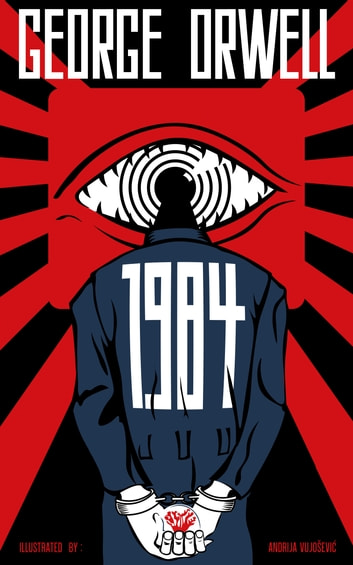 A classic never dies! Arguably the greatest of all the social sci/fi dystopian novels, "1984's" cautionary themes ring true to this very day (and likely will for all of time). It's an excellent thought exercise for all humans to examine and re-examine throughout our lives in the hopes of building the societies and world in which we want to live, and to avoid those ones that are destructive. - Ryan Splenda
A classic never dies! Arguably the greatest of all the social sci/fi dystopian novels, "1984's" cautionary themes ring true to this very day (and likely will for all of time). It's an excellent thought exercise for all humans to examine and re-examine throughout our lives in the hopes of building the societies and world in which we want to live, and to avoid those ones that are destructive. - Ryan Splenda
Winston Smith toes the Party line, rewriting history to satisfy the demands of the Ministry of Truth. With each lie he writes, Winston grows to hate the Party that seeks power for its own sake and persecutes those who dare to commit thoughtcrimes. But as he starts to think for himself, Winston can’t escape the fact that Big Brother is always watching...
A startling and haunting novel, "1984" creates an imaginary world that is completely convincing from start to finish. No one can deny the novel’s hold on the imaginations of whole generations, or the power of its admonitions—a power that seems to grow, not lessen, with the passage of time. - Publisher's Description
Request this Title
The Skeptics' Guide to the Future: What Yesterday's Science and Science Fiction Tell Us About the World of Tomorrow
Steven Novella (1969) | Selected by Chasz Griego
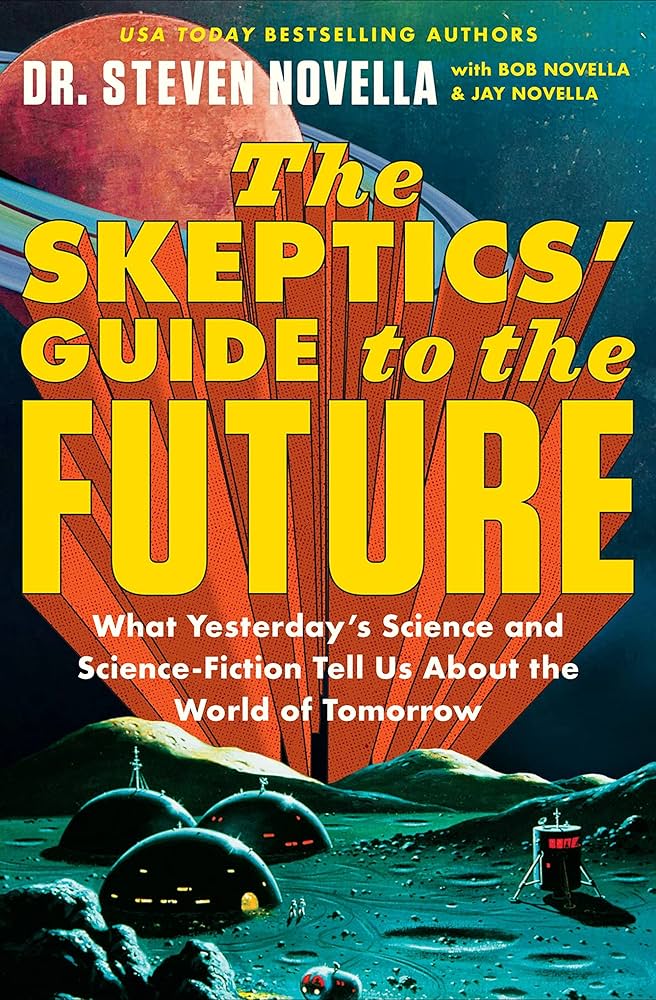 This book is science non-fiction about science fiction. The author talks through popular technology and phenomena that have appeared in popular sci-fi through a scientific lens, discussing where we are with creating this technology, how much longer it could take, or if it's even possible to achieve. Some of the topics include, robots and brain-machine interfaces, quantum computers, terraforming other worlds, artificial gravity, and more. - Chasz Griego
This book is science non-fiction about science fiction. The author talks through popular technology and phenomena that have appeared in popular sci-fi through a scientific lens, discussing where we are with creating this technology, how much longer it could take, or if it's even possible to achieve. Some of the topics include, robots and brain-machine interfaces, quantum computers, terraforming other worlds, artificial gravity, and more. - Chasz Griego
Our predictions of the future are a wild fantasy, inextricably linked to our present hopes and fears, biases and ignorance. Whether they be the outlandish leaps predicted in the 1920s, like multi-purpose utility belts with climate control capabilities and planes the size of luxury cruise ships, or the forecasts of the ‘60s, which didn’t anticipate the sexual revolution or women’s liberation, the path to the present is littered with failed predictions and incorrect estimations. The best we can do is try to absorb the lessons from futurism's checkered past, perhaps learning to do a little better.
In "The Skeptics' Guide to the Future," Steven Novella and his co-authors build upon the work of futurists of the past by examining what they got right, what they got wrong, and how they came to those conclusions. By exploring the pitfalls of each era, they give their own speculations about the distant future, transformed by unbelievable technology ranging from genetic manipulation to artificial intelligence and quantum computing. Applying their trademark skepticism, they carefully extrapolate upon each scientific development, leaving no stone unturned as they lay out a vision for the future. - Publisher's Description
The Diamond Age: Or, A Young Lady's Illustrated Primer
Neal Stephenson (2000) | Selected by Charlotte Kiger Price
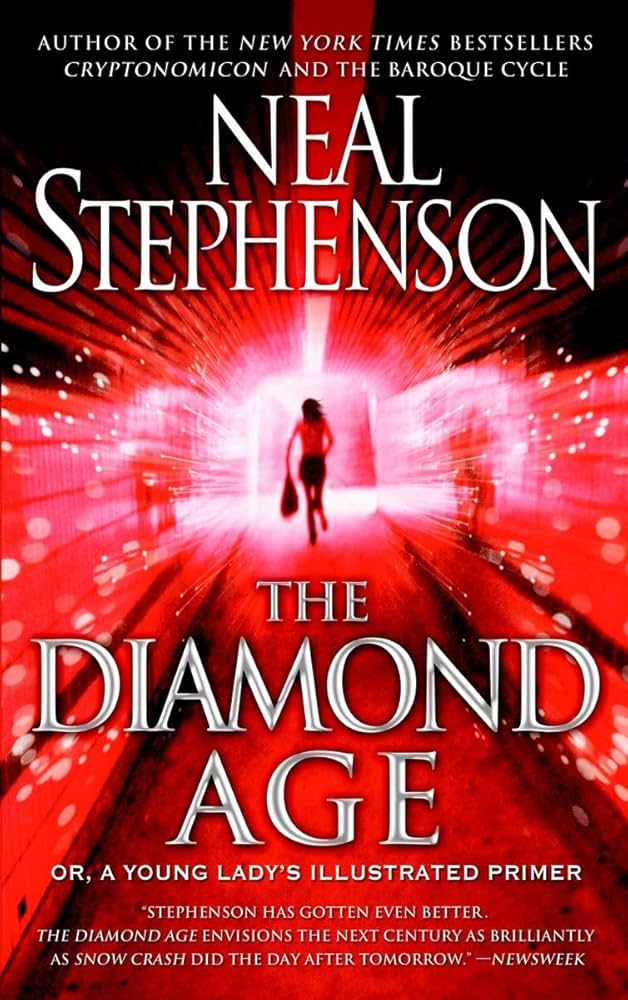 This isn't Stephenson's most famous book (that would probably be "Snow Crash" or "Cryptonomicon"), but it's been one I've come back to several times in the past 20 years. The exploration of social class within a semi-Victorian future-tech society, full of nanotech and AI, from the viewpoint of a young girl's education really intrigued me. It's a bit like Dickens, but cyberpunk and with a lot more folklore. - Charlotte Kiger Price
This isn't Stephenson's most famous book (that would probably be "Snow Crash" or "Cryptonomicon"), but it's been one I've come back to several times in the past 20 years. The exploration of social class within a semi-Victorian future-tech society, full of nanotech and AI, from the viewpoint of a young girl's education really intrigued me. It's a bit like Dickens, but cyberpunk and with a lot more folklore. - Charlotte Kiger Price
Decades into our future, a stone’s throw from the ancient city of Shanghai, a brilliant nanotechnologist named John Percival Hackworth has just broken the rigorous moral code of his tribe, the powerful neo-Victorians. He's made an illicit copy of a state-of-the-art interactive device called "A Young Lady's Illustrated Primer." Commissioned by an eccentric duke for his grandchild, stolen for Hackworth's own daughter, the Primer’s purpose is to educate and raise a girl capable of thinking for herself. It performs its function superbly. Unfortunately for Hackworth, his smuggled copy has fallen into the wrong hands.
Young Nell and her brother Harv are thetes—members of the poor, tribeless class. Neglected by their mother, Harv looks after Nell. When he and his gang waylay a certain neo-Victorian—John Percival Hackworth—in the seamy streets of their neighborhood, Harv brings Nell something special: the Primer.
Following the discovery of his crime, Hackworth begins an odyssey of his own. Expelled from the neo-Victorian paradise, squeezed by agents of Protocol Enforcement on one side and a Mandarin underworld crime lord on the other, he searches for an elusive figure known as the Alchemist. His quest and Nell’s will ultimately lead them to another seeker whose fate is bound up with the Primer—a woman who holds the key to a vast, subversive information network that is destined to decode and reprogram the future of humanity. - Publisher's Description
Feed
M.T. Anderson (2012) | Selected by Joelle Pitts
 Of course, "Ready Player One" is my all-time favorite in this genre (see last year's post), but since I've already shared that one, I'll go with "Feed" this year. I read this during my undergrad years, but it sticks with me as an uncannily prescient look into the future of personal data, social media/corporate power, and tech-augmented consumerism. I saw something the other day on a marketing scheme built on AI-generated personalized ads delivered by avatar which address you by name and attempt to convince you to buy one product or another using your purchase history. And I thought, "Wasn't this scenario described in Feed?"
Of course, "Ready Player One" is my all-time favorite in this genre (see last year's post), but since I've already shared that one, I'll go with "Feed" this year. I read this during my undergrad years, but it sticks with me as an uncannily prescient look into the future of personal data, social media/corporate power, and tech-augmented consumerism. I saw something the other day on a marketing scheme built on AI-generated personalized ads delivered by avatar which address you by name and attempt to convince you to buy one product or another using your purchase history. And I thought, "Wasn't this scenario described in Feed?"
This one falls into the YA category and audience, but I think it deserves to be recognized along with some of the other great cyberpunk tales like "Neuromancer," "Down and Out in the Magic Kingdom," and "The Diamond Age." - Joelle Pitts
For Titus and his friends, it started out like any ordinary trip to the moon — a chance to party during spring break. But that was before the crazy hacker caused all their feeds to malfunction, sending them to the hospital to lie around with nothing inside their heads for days. And it was before Titus met Violet, a beautiful, brainy teenage girl who has decided to fight the feed and its ever-present ability to categorize human thoughts and desires. M. T. Anderson’s not-so-brave new world is a smart, savage satire that has captivated readers with its view of an imagined future that veers unnervingly close to the here and now. - Publisher's Description
The Shadow of the Torturer (The Book of the New Sun, Vol. 1)
Gene Wolfe (1980-83, 1987) | Selected by Shannon Baldridge
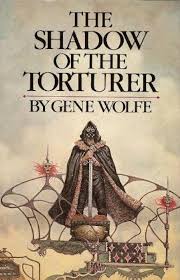 The four volumes and fifth coda that make up the classic sci-fi/fantasy epic, "The Book of the New Sun" are certainly not for everyone. The story is often very dark, often primal in nature, and notoriously hard to follow given Wolfe's proclivity for unreliable narrators. That being said, it's a worthwhile endeavor for readers with a fascination for etymology and classical philology as he calls back to dead words and archaic terminology from a distance past to create this highly magical vision of a dying earth set a million years into the future. - Shannon Baldridge
The four volumes and fifth coda that make up the classic sci-fi/fantasy epic, "The Book of the New Sun" are certainly not for everyone. The story is often very dark, often primal in nature, and notoriously hard to follow given Wolfe's proclivity for unreliable narrators. That being said, it's a worthwhile endeavor for readers with a fascination for etymology and classical philology as he calls back to dead words and archaic terminology from a distance past to create this highly magical vision of a dying earth set a million years into the future. - Shannon Baldridge
Severian is a torturer, born to the guild and with an exceptionally promising career ahead of him . . . until he falls in love with one of his victims, a beautiful young noblewoman. Her excruciations are delayed for some months and, out of love, Severian helps her commit suicide and escape her fate. For a torturer, there is no more unforgivable act. In punishment he is exiled from the guild and his home city to the distant metropolis of Thrax with little more than Terminus Est, a fabled sword, to his name. Along the way he has to learn to survive in a wider world without the guild - a world in which he has already made both allies and enemies. And a strange gem is about to fall into his possession, which will only make his enemies pursue him with ever-more determination. - Publisher's Description
Request this Title
Childhood's End
Arthur C. Clark (1953) | Selected by Shannon Baldridge
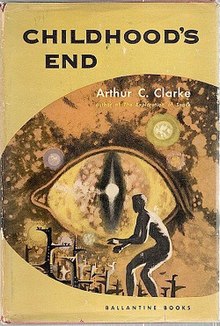 The first time I read "Childhood's End," I remember feeling slightly unnerved at Clark's prescient vision of the future of humanity. Don't do as I did and look up images of this book or you may ruin the big reveal of the appearance of the Overlords. - Shannon Baldridge
The first time I read "Childhood's End," I remember feeling slightly unnerved at Clark's prescient vision of the future of humanity. Don't do as I did and look up images of this book or you may ruin the big reveal of the appearance of the Overlords. - Shannon Baldridge
"Childhood’s End" is one of the defining legacies of Arthur C. Clarke, the author of "2001: A Space Odyssey" and many other groundbreaking works. Since its publication in 1953, this prescient novel about first contact gone wrong has come to be regarded not only as a science fiction classic but as a literary thriller of the highest order.
Spaceships have suddenly appeared in the skies above every city on the planet. Inside is an intellectually, technologically, and militarily superior alien race known as the Overlords. At first, their demands seem benevolent: unify Earth, eliminate poverty, end war. But at what cost? To those who resist, it’s clear that the Overlords have an agenda of their own. Has their arrival marked the end of humankind . . . or the beginning? - Publisher's Description
Request this Title
Slaughterhouse-Five, or, The Children's Crusade: A Duty-Dance with Death
Kurt Vonnegut (1969) | Selected by Shannon Baldridge
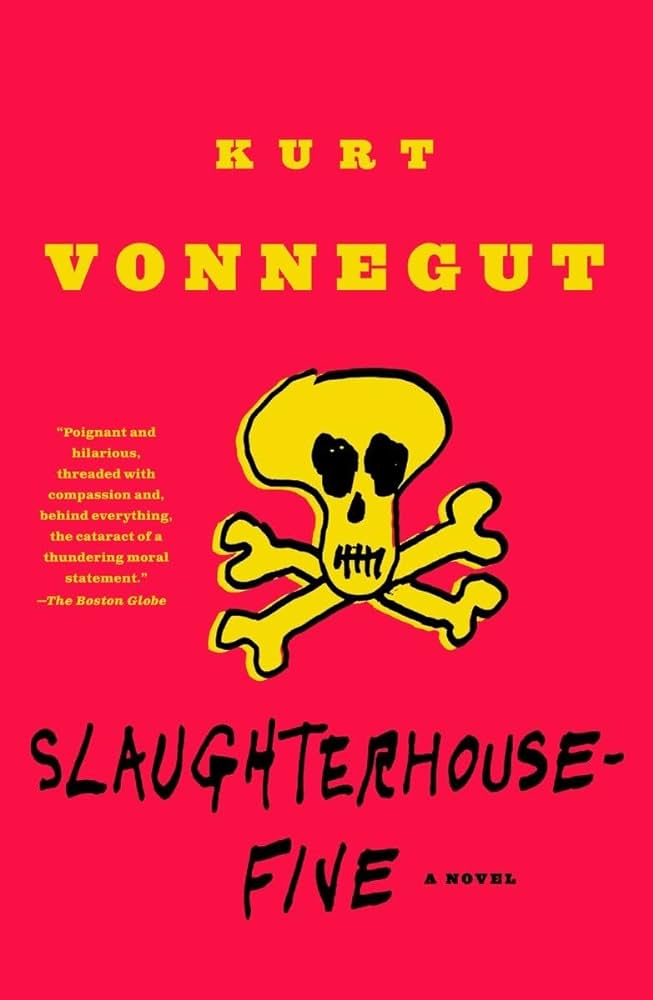 The gruesome reality of a first person account of the horrors of war juxtaposed with fantastical sci-fi elements and Vonnegut's gallows humor, make this novel a true anti-war masterpiece. - Shannon Baldridge
The gruesome reality of a first person account of the horrors of war juxtaposed with fantastical sci-fi elements and Vonnegut's gallows humor, make this novel a true anti-war masterpiece. - Shannon Baldridge
Kurt Vonnegut’s darkly comic novel of survival and sanity in times of desperation resonates to this day. Drawing from his experience surviving the fire-bombing of Dresden at the end of World War II, Vonnegut transforms trauma into a time-hopping work of imagination. The novel begins when Billy Pilgrim becomes “unstuck in time” and launches into fourth dimensional time travel, journeying from the Battle of the Bulge to the planet of Tralfamadore. Defying genre, Vonnegut’s masterpiece encompassed science fiction, satire, and the classic war novel as the book soared to its singular perch in the heights of American letters. - Publisher's Description
Request this Title
Dune
Frank Herbet (1965) | Selected by Shannon Baldridge
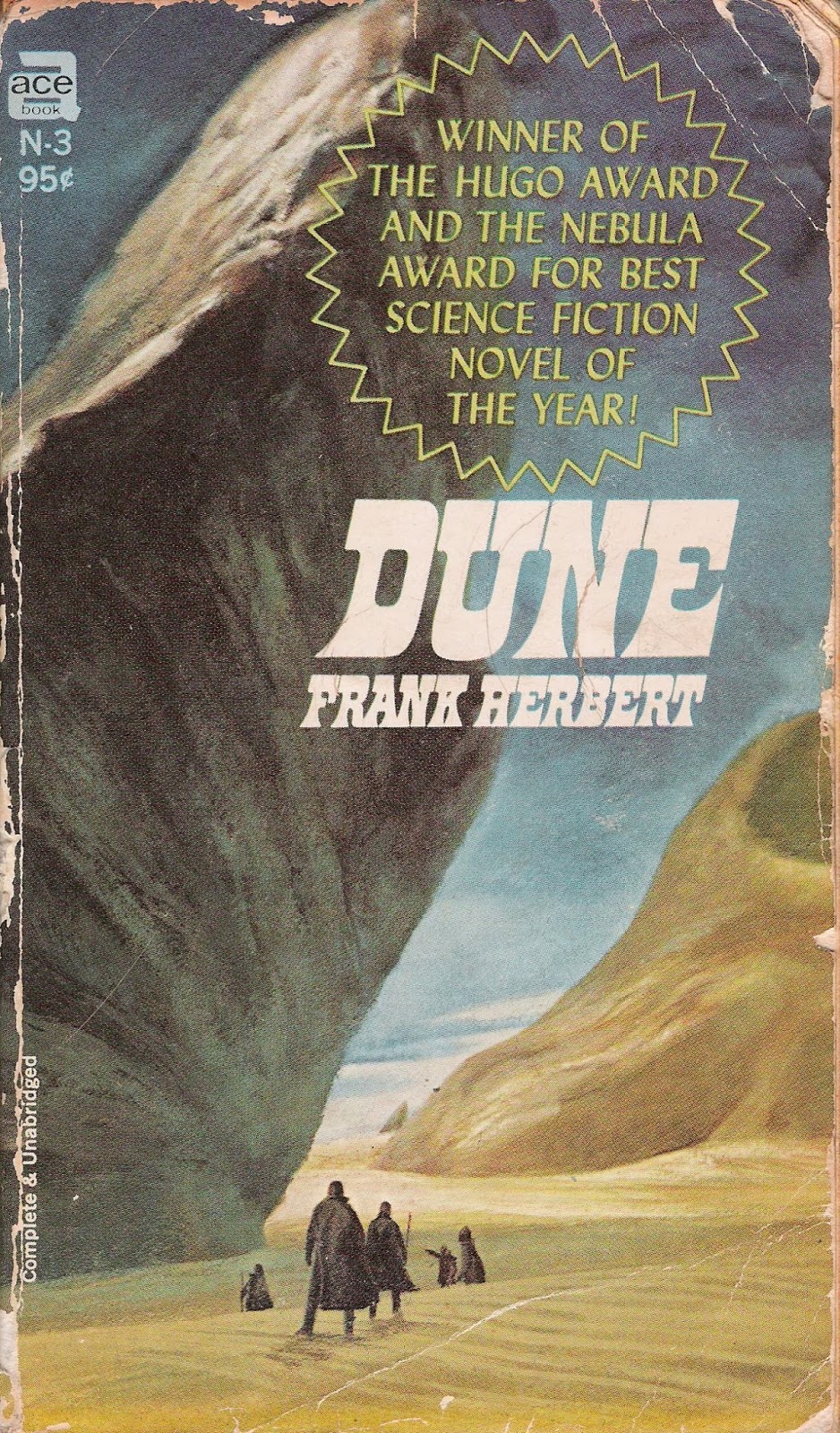 Although I've already expressed my love for this book in our previous list comparing books to their film adaptations, I would feel remiss not to include my all-time favorite work of science fiction. - Shannon Baldridge
Although I've already expressed my love for this book in our previous list comparing books to their film adaptations, I would feel remiss not to include my all-time favorite work of science fiction. - Shannon Baldridge
Frank Herbert’s classic masterpiece—a triumph of the imagination and one of the bestselling science fiction novels of all time. Set on the desert planet Arrakis, "Dune" is the story of the boy Paul Atreides, heir to a noble family tasked with ruling an inhospitable world where the only thing of value is the spice melange, a drug capable of extending life and enhancing consciousness.
Coveted across the known universe, melange is a prize worth killing for.... When House Atreides is betrayed, the destruction of Paul’s family will set the boy on a journey toward a destiny greater than he could ever have imagined. And as he evolves into the mysterious man known as Muad’Dib, he will bring to fruition humankind’s most ancient and unattainable dream. A stunning blend of adventure and mysticism, environmentalism and politics, "Dune" won the first Nebula Award, shared the Hugo Award, and formed the basis of what is undoubtedly the grandest epic in science fiction. - Publisher's Description
The Dispossessed
Ursula K. Le Guin (1974) | Selected by Shannon Baldridge
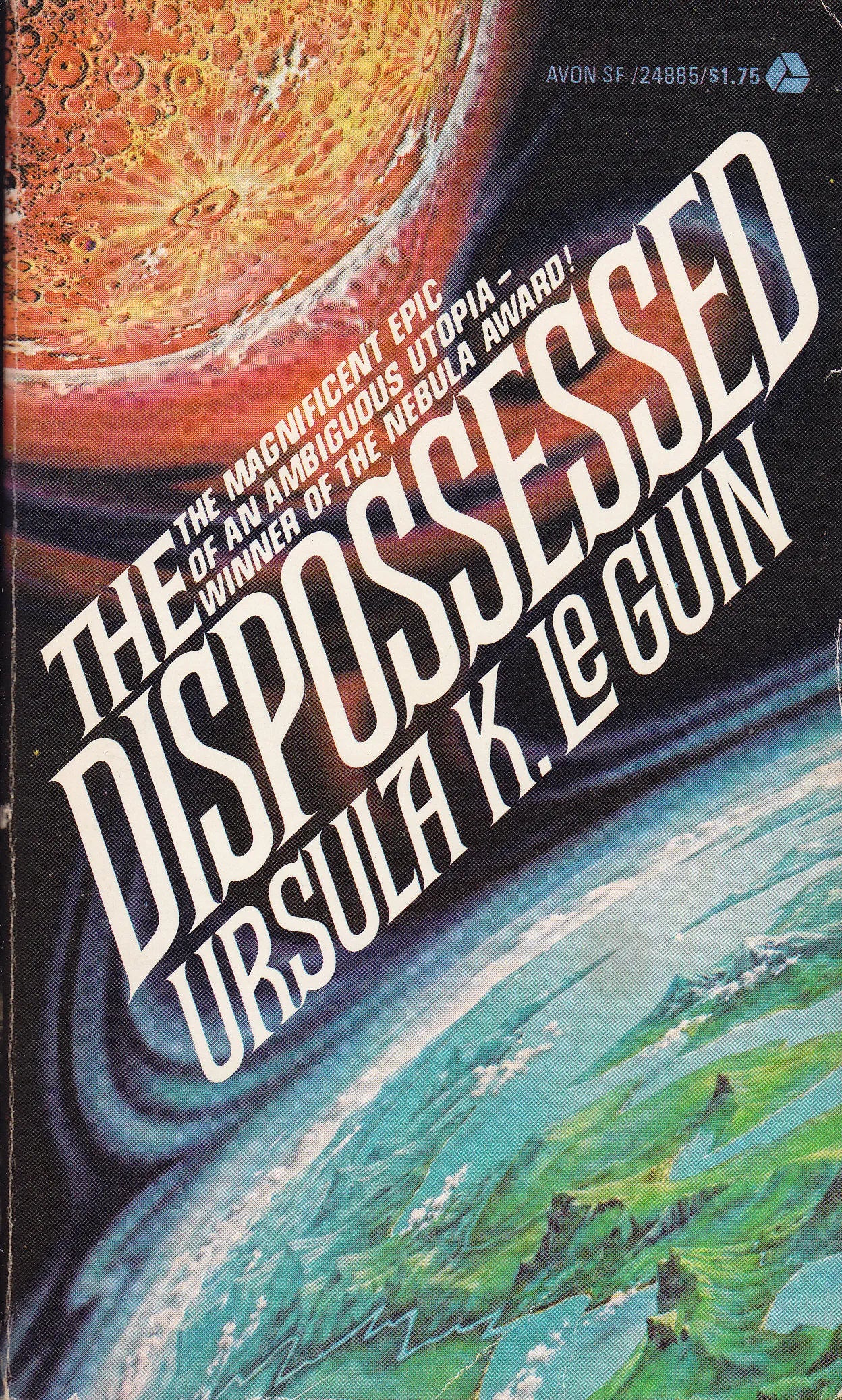 Like many, Le Guin's masterpiece, "A Wizard of Earthsea" was my first introduction to this highly-underrated literary giant. I then explored her many works outside of YA literature. Written 50 years ago, "The Dispossessed," masterfully explores complex cultural conundrums still facing society today, pitting anarchism against capitalism and individualism against collectivism, with the ultimate aim of an ambiguously ambitious utopia. - Shannon Baldridge
Like many, Le Guin's masterpiece, "A Wizard of Earthsea" was my first introduction to this highly-underrated literary giant. I then explored her many works outside of YA literature. Written 50 years ago, "The Dispossessed," masterfully explores complex cultural conundrums still facing society today, pitting anarchism against capitalism and individualism against collectivism, with the ultimate aim of an ambiguously ambitious utopia. - Shannon Baldridge
A bleak moon settled by utopian anarchists, Anarres has long been isolated from other worlds, including its mother planet, Urras—a civilization of warring nations, great poverty, and immense wealth. Now Shevek, a brilliant physicist, is determined to reunite the two planets, which have been divided by centuries of distrust. He will seek answers, question the unquestionable, and attempt to tear down the walls of hatred that have kept them apart.
To visit Urras—to learn, to teach, to share—will require great sacrifice and risks, which Shevek willingly accepts. But the ambitious scientist's gift is soon seen as a threat, and in the profound conflict that ensues, he must reexamine his beliefs even as he ignites the fires of change. - Publisher's Description
